Deck 12: Rl Circuits
Question
Question
Question
Question
Question
Question
Question
Question
Question
Question
Question
Question
Question
Question
Question
Question
Question
Question
Question
Question
Question
Question
Question
Question
Question
Question
Question
Question
Question
Question
Question
Question
Question
Question
Question
Question
Question
Question
Question
Question
Question
Question
Question
Question
Question
Question
Question
Question
Question
Question
Question
Question
Question
Question
Question
Question
Question
Question
Question
Question
Question
Question
Question
Question

Unlock Deck
Sign up to unlock the cards in this deck!
Unlock Deck
Unlock Deck
1/64
Play
Full screen (f)
Deck 12: Rl Circuits
1
The impedance of a series RL circuit is found by directly adding the values of XL and R .
False
2
The impedance of an RL series circuit varies inversely With the frequency.
False
3
If the frequency increases in an RL circuit, the impedance decreases.
False
4
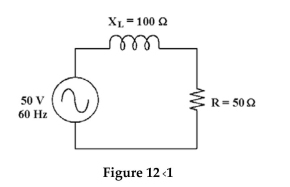
If the frequency increases in Figure 12-1, the phase angle ________.
A)changes to another quadrant
B)increases
C)decreases
D)remains the same

Unlock Deck
Unlock for access to all 64 flashcards in this deck.
Unlock Deck
k this deck
5
The output at the cut off frequency of a low pass RL filter is 0 V.

Unlock Deck
Unlock for access to all 64 flashcards in this deck.
Unlock Deck
k this deck
6

Calculate the true power in Figure 12-1.
A)1W
B)10W
C)400 mW
D)4W

Unlock Deck
Unlock for access to all 64 flashcards in this deck.
Unlock Deck
k this deck
7
An ohmmeter can be used to accurately test the impedance of an RL circuit.

Unlock Deck
Unlock for access to all 64 flashcards in this deck.
Unlock Deck
k this deck
8
If the inductance increases in an RL filter circuit, the cutoff frequency increases.

Unlock Deck
Unlock for access to all 64 flashcards in this deck.
Unlock Deck
k this deck
9
The impedance of a series RL circuit is found by adding the values of XL and R using a phasor diagram.

Unlock Deck
Unlock for access to all 64 flashcards in this deck.
Unlock Deck
k this deck
10
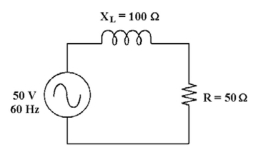
-What is the impedance in Figure 12-1?
A) 1120
B) 104
C) 1040
D) 112

Unlock Deck
Unlock for access to all 64 flashcards in this deck.
Unlock Deck
k this deck
11
The source voltage always lags the total current in an RL circuit.

Unlock Deck
Unlock for access to all 64 flashcards in this deck.
Unlock Deck
k this deck
12

If the frequency increases in Figure 12-1, inductance ________.
A)increases
B)decreases
C)decreases to zero
D)remains the same

Unlock Deck
Unlock for access to all 64 flashcards in this deck.
Unlock Deck
k this deck
13
A high-pass filter passes high frequencies and blocks low frequencies.

Unlock Deck
Unlock for access to all 64 flashcards in this deck.
Unlock Deck
k this deck
14
If the resistance decreases in an RL filter circuit, the cutoff frequency increases.

Unlock Deck
Unlock for access to all 64 flashcards in this deck.
Unlock Deck
k this deck
15

If the frequency increases in Figure 12-1, the current ________.
A)decreases to zero
B)decreases
C)remains the same
D)increases

Unlock Deck
Unlock for access to all 64 flashcards in this deck.
Unlock Deck
k this deck
16
Power dissipated by the resistor in a parallel RL circuit can be increased With the addition of a capacitor in parallel.

Unlock Deck
Unlock for access to all 64 flashcards in this deck.
Unlock Deck
k this deck
17
The overall phase angle of a parallel circuit with a resistance of 20  and an inductive reactance of 25
and an inductive reactance of 25  would be nearly 90 degrees.
would be nearly 90 degrees.
 and an inductive reactance of 25
and an inductive reactance of 25  would be nearly 90 degrees.
would be nearly 90 degrees.
Unlock Deck
Unlock for access to all 64 flashcards in this deck.
Unlock Deck
k this deck
18
The source voltage always leads the total current in an RL circuit.

Unlock Deck
Unlock for access to all 64 flashcards in this deck.
Unlock Deck
k this deck
19
A low-pass filter passes high frequencies and blocks other frequencies.

Unlock Deck
Unlock for access to all 64 flashcards in this deck.
Unlock Deck
k this deck
20

If the frequency is 60 Hz in Figure 12-1,What is the inductance?
A)26.5 mH
B)265 mH
C)3.77 mH
D)3.77 H

Unlock Deck
Unlock for access to all 64 flashcards in this deck.
Unlock Deck
k this deck
21

What is the voltage across the inductor in Figure 12-1?
A)4.47V
B)0.4V
C)0.894V
D)44.6V

Unlock Deck
Unlock for access to all 64 flashcards in this deck.
Unlock Deck
k this deck
22

What is the phase angle in Figure 12-1 ?
A) 86.3°
B) 54.3°
C) 71.2°
D) 63.4°

Unlock Deck
Unlock for access to all 64 flashcards in this deck.
Unlock Deck
k this deck
23
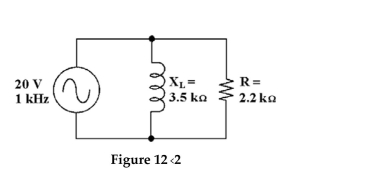
What change Would increase the power factor in Figure 12-2?
A) increasing the value of the resistor
B) decreasing the source voltage
C) decreasing the value of the resistor
D) increasing the source voltage

Unlock Deck
Unlock for access to all 64 flashcards in this deck.
Unlock Deck
k this deck
24

What is the total impedance in Figure 12-2?
A) 5.71

B) 9.09

C) 1.07

D) 1.86


Unlock Deck
Unlock for access to all 64 flashcards in this deck.
Unlock Deck
k this deck
25

What is the cut off frequency in Figure 12-1?
A)63 Hz
B)30 Hz
C)25 Hz
D)408 Hz

Unlock Deck
Unlock for access to all 64 flashcards in this deck.
Unlock Deck
k this deck
26

If the resistance increases in Figure 12-2, the total current ________.
A)decreases
B)decreases to zero
C)remains the same
D)increases

Unlock Deck
Unlock for access to all 64 flashcards in this deck.
Unlock Deck
k this deck
27

What is the apparent power in Figure 12-1?
A)0.8VA
B)22.27VA
C)8.94VA
D)0.4VA

Unlock Deck
Unlock for access to all 64 flashcards in this deck.
Unlock Deck
k this deck
28

If the frequency decreases in Figure 12-1, the phase angle ________ and the current ________.
A)increases, increases
B)increases, decreases
C)decreases, decreases
D)decreases, increases

Unlock Deck
Unlock for access to all 64 flashcards in this deck.
Unlock Deck
k this deck
29

If the operating frequency decreases in Figure 12-1, the inductance ________.
A)decreases
B)remains the same
C)decreases to zero
D)increases

Unlock Deck
Unlock for access to all 64 flashcards in this deck.
Unlock Deck
k this deck
30

What change Would decrease the power factor in Figure 12-2?
A) Increase the source voltage.
B) Decrease the value of the resistor.
C) Decrease the source voltage.
D) Increase the value of the resistor

Unlock Deck
Unlock for access to all 64 flashcards in this deck.
Unlock Deck
k this deck
31

If the frequency decreases in Figure 12-1, the phase angle ________ and the impedance ________.
A)increases, increases
B)decreases, decreases
C)decreases, increases
D)increases, decreases

Unlock Deck
Unlock for access to all 64 flashcards in this deck.
Unlock Deck
k this deck
32

If the resistor decreases in Figure 12-2, the total current ________.
A)remains the same
B)decreases
C)increases
D)decreases to zero

Unlock Deck
Unlock for access to all 64 flashcards in this deck.
Unlock Deck
k this deck
33

If the frequency increases in Figure 12-1, the phase angle ________ and the current ________.
A)decreases, increases
B)increases, decreases
C)decreases, decreases
D)increases, increases

Unlock Deck
Unlock for access to all 64 flashcards in this deck.
Unlock Deck
k this deck
34

If the source voltage changes to 100 V in Figure 12-1, the true power is ________.
A)16W
B)40 mW
C)4W
D)40W

Unlock Deck
Unlock for access to all 64 flashcards in this deck.
Unlock Deck
k this deck
35

If the frequency is 400 Hz in Figure 12-1,What is the inductance?
A)39.8 mH
B)25.12 H
C)39.8 H
D)25.1 mH

Unlock Deck
Unlock for access to all 64 flashcards in this deck.
Unlock Deck
k this deck
36

If the operating frequency decreases in Figure 12-1, the current ________.
A)decreases
B)increases
C)decreases to zero
D)remains the same

Unlock Deck
Unlock for access to all 64 flashcards in this deck.
Unlock Deck
k this deck
37

If the operating frequency decreases in Figure 12-1, the phase angle ________.
A)changes to another quadrant
B)remains the same
C)increases
D)decreases

Unlock Deck
Unlock for access to all 64 flashcards in this deck.
Unlock Deck
k this deck
38
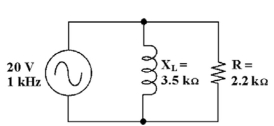
-If the resistance increased to 10 in Figure 12-2 , the total impedance is__________
A) 13.2
B) 3.30
C) 6.61
D) infinite

Unlock Deck
Unlock for access to all 64 flashcards in this deck.
Unlock Deck
k this deck
39

Which statement describes the relationship of IL and IR in Figure 12-2?
A) They are 180° out of phase.
B) IL lags IR.
C) They are in phase.
D) IL leads IR.

Unlock Deck
Unlock for access to all 64 flashcards in this deck.
Unlock Deck
k this deck
40

If the frequency increases in Figure 12-1, the phase angle ________ and the impedance ________.
A)decreases, decreases
B)decreases, increases
C)increases, decreases
D)increases, increases

Unlock Deck
Unlock for access to all 64 flashcards in this deck.
Unlock Deck
k this deck
41
If a high-pass RL filterʹs cutoff frequency is 55 kHz, its bandwidth is theoretically ________.
A)0 kHz
B)55 kHz
C)110 kHz
D)infinite
A)0 kHz
B)55 kHz
C)110 kHz
D)infinite

Unlock Deck
Unlock for access to all 64 flashcards in this deck.
Unlock Deck
k this deck
42
An RL lag network is similar to a:
A)stop pass filter.
B)low pass filter.
C)band pass filter.
D)high pass filter.
A)stop pass filter.
B)low pass filter.
C)band pass filter.
D)high pass filter.

Unlock Deck
Unlock for access to all 64 flashcards in this deck.
Unlock Deck
k this deck
43
An RL high pass filter takes its output across:
A)the series resistor.
B)the parallel resistor.
C)the parallel inductor.
D)the series inductor.
A)the series resistor.
B)the parallel resistor.
C)the parallel inductor.
D)the series inductor.

Unlock Deck
Unlock for access to all 64 flashcards in this deck.
Unlock Deck
k this deck
44
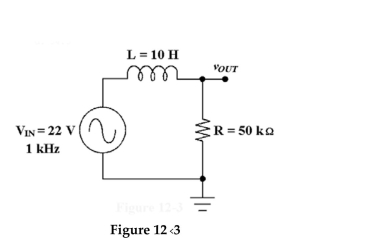
What is the cutoff frequency in Figure 12-3?
A)7.96 kHz
B)796 Hz
C)637 kHz
D)637 Hz

Unlock Deck
Unlock for access to all 64 flashcards in this deck.
Unlock Deck
k this deck
45

What is the phase angle in Figure 12-3 , at the cutoff frequency?
A) 49.9°
B) 51.4°
C) 45.0°
D) 54.3°

Unlock Deck
Unlock for access to all 64 flashcards in this deck.
Unlock Deck
k this deck
46
In a series RL circuit, as the phase angle between the applied voltage and the total current increases, this is the same as:
A)power factor increasing.
B)true power decreasing.
C)power factor decreasing.
D)apparent power decreasing.
A)power factor increasing.
B)true power decreasing.
C)power factor decreasing.
D)apparent power decreasing.

Unlock Deck
Unlock for access to all 64 flashcards in this deck.
Unlock Deck
k this deck
47
In a RL circuit, the inductive reactance is:
A)directly proportional to the inductance.
B)increases as the frequency increases.
C)directly proportional to the frequency.
D)all of these.
A)directly proportional to the inductance.
B)increases as the frequency increases.
C)directly proportional to the frequency.
D)all of these.

Unlock Deck
Unlock for access to all 64 flashcards in this deck.
Unlock Deck
k this deck
48

The circuit in Figure 12-3 is known as a ________ filter.
A)band-pass
B)low-pass
C)high-pass
D)notch

Unlock Deck
Unlock for access to all 64 flashcards in this deck.
Unlock Deck
k this deck
49

What effect Will an open inductor have on the circuit in Figure 12-3?
A) The current will drop to zero.
B) The output voltage at the cutoff frequency will decrease.
C) The output voltage at the cutoff frequency will increase.
D) The cutoff frequency will increase.

Unlock Deck
Unlock for access to all 64 flashcards in this deck.
Unlock Deck
k this deck
50
In an RL filter circuit, the cutoff frequency is defined as the frequency at Which:
A)the outputVoltage drops to 33% of maximum.
B)the outputVoltage drops to 70% of maximum.
C)the outputVoltage is cutoff, with minimum or zero output.
D)the outputVoltage drops to 66% of maximum.
A)the outputVoltage drops to 33% of maximum.
B)the outputVoltage drops to 70% of maximum.
C)the outputVoltage is cutoff, with minimum or zero output.
D)the outputVoltage drops to 66% of maximum.

Unlock Deck
Unlock for access to all 64 flashcards in this deck.
Unlock Deck
k this deck
51
If the true power is 10W and the reactive power is 10 VAR, the apparent power is ________.
A)5V
B)14.1V
C)20V
D)100V
A)5V
B)14.1V
C)20V
D)100V

Unlock Deck
Unlock for access to all 64 flashcards in this deck.
Unlock Deck
k this deck
52
If a low-pass RL filterʹs cutoff frequency is 20 kHz, its bandwidth is ________.
A)40 kHz
B)20 kHz
C)0 Hz
D)unknown
A)40 kHz
B)20 kHz
C)0 Hz
D)unknown

Unlock Deck
Unlock for access to all 64 flashcards in this deck.
Unlock Deck
k this deck
53
When an ac voltage is supplied to an RL circuit, the acʹs current and amplitude Will be:
A)similar in Wave form.
B)varying in the same manner.
C)lagging the Voltage.
D)all of these.
A)similar in Wave form.
B)varying in the same manner.
C)lagging the Voltage.
D)all of these.

Unlock Deck
Unlock for access to all 64 flashcards in this deck.
Unlock Deck
k this deck
54

If some of the turns of the inductor in Figure 12-3 have shorted, howW ill the circuit change?
A)The outputVoltage at the cutoff frequency Will decrease.
B)The cutoff frequency will increase.
C)The outputVoltage at the cutoff frequency Will increase.
D)The cutoff frequency Will decrease.

Unlock Deck
Unlock for access to all 64 flashcards in this deck.
Unlock Deck
k this deck
55
If a load is purely inductive and the reactive power is 10 VAR, the apparent power is ________.
A)14.14V
B)3.16V
C)10V
D)1.144V
A)14.14V
B)3.16V
C)10V
D)1.144V

Unlock Deck
Unlock for access to all 64 flashcards in this deck.
Unlock Deck
k this deck
56
Power in an RL circuit can be measured as:
A) apparent power (Pa) .
B) true power (Ptrue).
C) reactive power (Pr) .
D) all of these.
A) apparent power (Pa) .
B) true power (Ptrue).
C) reactive power (Pr) .
D) all of these.

Unlock Deck
Unlock for access to all 64 flashcards in this deck.
Unlock Deck
k this deck
57

If the output is taken across the inductor in Figure 12-3, the circuit is known as a ________.
A)low-pass filter
B)band-pass filter
C)notch filter
D)high-pass filter

Unlock Deck
Unlock for access to all 64 flashcards in this deck.
Unlock Deck
k this deck
58

What is VOUT at the cutoff frequency in Figure 12-3?
A)14.4V
B)12.9V
C)15.6V
D)15.1V

Unlock Deck
Unlock for access to all 64 flashcards in this deck.
Unlock Deck
k this deck
59
A measured voltage of 0 V across the resistor in a parallel RL circuit Would indicate:
A)an open in the resistor.
B)a blown fuse.
C)an short in the inductor.
D)either A or B.
A)an open in the resistor.
B)a blown fuse.
C)an short in the inductor.
D)either A or B.

Unlock Deck
Unlock for access to all 64 flashcards in this deck.
Unlock Deck
k this deck
60
If the resistive current is 2 A and the inductive current is 2 A in a parallel RL circuit, total current is ________.
A)5.66 A
B)2.83 A
C)4 A
D)2 A
A)5.66 A
B)2.83 A
C)4 A
D)2 A

Unlock Deck
Unlock for access to all 64 flashcards in this deck.
Unlock Deck
k this deck
61
After having troubleshot a series RL circuit, you check the resistance of the inductor and it is around 40 ohms.W hat conclusion does this bring you to?
A)Since the inductorʹsVoltage Was nearly zero, you are sure the Windings have shorted.
B)Since the inductorʹsVoltage Was nearly zero, the inductor is probably okay so the resistor must be shorted.
C)Since the inductorʹsVoltage Was nearly zero, the inductor is probably okay, so the resistor must be open.
D)not enough information
A)Since the inductorʹsVoltage Was nearly zero, you are sure the Windings have shorted.
B)Since the inductorʹsVoltage Was nearly zero, the inductor is probably okay so the resistor must be shorted.
C)Since the inductorʹsVoltage Was nearly zero, the inductor is probably okay, so the resistor must be open.
D)not enough information

Unlock Deck
Unlock for access to all 64 flashcards in this deck.
Unlock Deck
k this deck
62
It is suspected that a high pass filterʹs cutoff frequency has changed.W hat pieces of test equipment could be used to check it out?
A)an oscilloscope and a square Wave generator
B)voltmeter and a sine Wave generator
C)either A or B
D)none of the above
A)an oscilloscope and a square Wave generator
B)voltmeter and a sine Wave generator
C)either A or B
D)none of the above

Unlock Deck
Unlock for access to all 64 flashcards in this deck.
Unlock Deck
k this deck
63
The voltage measured across the inductor in a series RL has dropped significantly from normal. What could possibly be the problem?
A) The resistor has gone up in value.
B) partial shorting of the windings of the inductor
C) The resistor has gone down in value.
D) either A or B
A) The resistor has gone up in value.
B) partial shorting of the windings of the inductor
C) The resistor has gone down in value.
D) either A or B

Unlock Deck
Unlock for access to all 64 flashcards in this deck.
Unlock Deck
k this deck
64
Which of the following is typically most important of the three types of power in terms of Work being done?
A)reactive
B)inductive
C)apparent
D)true
A)reactive
B)inductive
C)apparent
D)true

Unlock Deck
Unlock for access to all 64 flashcards in this deck.
Unlock Deck
k this deck


